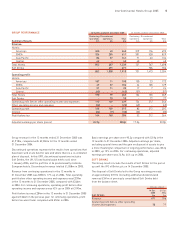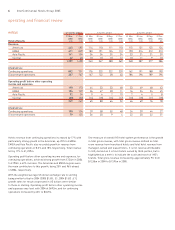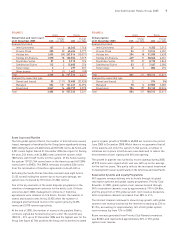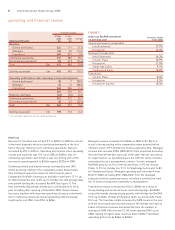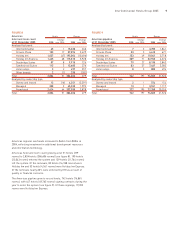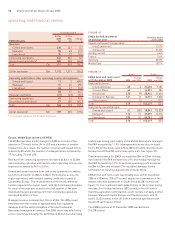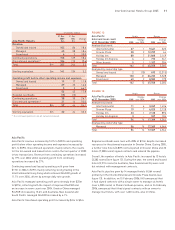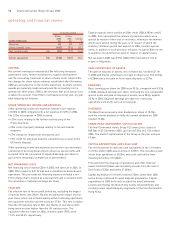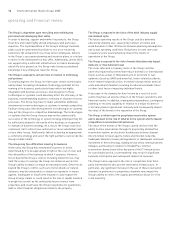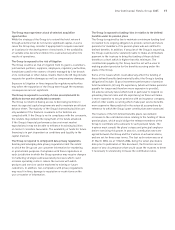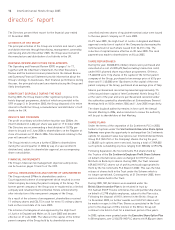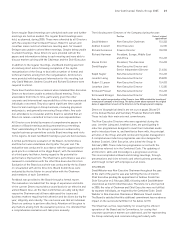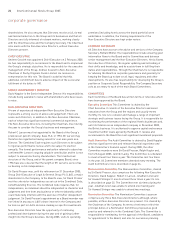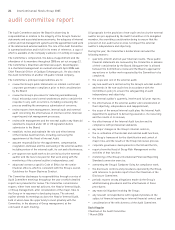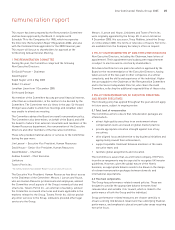Holiday Inn 2005 Annual Report Download - page 17
Download and view the complete annual report
Please find page 17 of the 2005 Holiday Inn annual report below. You can navigate through the pages in the report by either clicking on the pages listed below, or by using the keyword search tool below to find specific information within the annual report.
RISK FACTORS
This section describes some of the risks that could materially
affect the Group’s business. The risks outlined below should be
considered in connection with any financial and forward-looking
information in this OFR and the cautionary statements contained
on page 89.
The risks below are not the only ones that the Group faces. Some
risks are not yet known to the Group and some that the Group
does not currently believe to be material could later turn out to
be material. All of these risks could materially affect the Group’s
business, revenue, operating profit, earnings, net assets and
liquidity and/or capital resources, and equal weight should be
given to each of them.
The Group is exposed to the risks of political and
economic developments
These include the risks of global and regional adverse political,
economic and financial market developments, including recession,
inflation and currency fluctuations that could lower revenues and
reduce income. A recession would adversely affect room rates
and/or occupancy levels and other income-generating activities
resulting in deterioration of results of operations and potentially
affecting the value of properties in affected economies.
Further political or economic factors or regulatory action could
effectively prevent the Group from receiving profits from, or selling
its investments in, certain countries, or otherwise adversely affect
operations. For example, changes to tax rates or legislation in
the jurisdictions in which the Group operates could decrease the
proportion of the profits the Group is entitled to retain, or the
Group’s interpretation of various tax laws and regulations may
prove to be incorrect, resulting in higher than expected tax charges.
In addition, fluctuations in currency exchange rates between
sterling, the currency in which the Group reports its financial
statements, and the US dollar and other currencies in which the
Group’s international operations or investments do business, could
adversely affect the Group’s reported earnings and the value of its
business. Fluctuations of this type have been experienced over
recent years with the significant strengthening of the pound
against the dollar. As the Group’s profits have become increasingly
weighted towards North America, such fluctuations may have
a greater impact on the Group’s reported results.
The Group is reliant on the reputation of its brands and the
protection of its intellectual property rights
An event that materially damages the reputation of one or more
of the Group’s brands and/or failure to sustain the appeal of the
Group’s brands to its customers could have an adverse impact on
the value of that brand and subsequent revenues from that brand
or business.
In addition, the value of the Group’s brands is influenced by a
number of other factors including consumer preference and
perception, commoditisation (whereby the price/quality becomes
relatively more important than brand identifications), failure by the
Group or its franchisees to ensure compliance with the significant
regulations applicable to hotel operations (including fire and life
safety requirements), or other factors affecting consumers’
willingness to purchase goods and services, including any factor
which adversely affects the reputation of those brands.
In particular, the extent to which the Group is able to enforce
adherence to its operating and quality standards, or the significant
regulations applicable to hotel operations, pursuant to its
management and franchise contracts may further impact brand
reputation or customer perception and therefore the value of the
hotel brands.
Given the importance of brand recognition to the Group’s business,
the Group has invested considerable effort in protecting its
intellectual property, including by registration of trademarks and
domain names. If the Group is unable to protect its intellectual
property, any infringement or misappropriation could materially
harm its future financial results and ability to develop its business.
The Group is exposed to a variety of risks related to identifying,
securing and retaining management and franchise agreements
The Group’s growth strategy depends on its success in identifying,
securing and retaining management and franchise agreements.
Competition with other hotel companies may generally reduce the
number of suitable management, franchise and investment
opportunities offered to the Group, and increase the bargaining
power of property owners seeking to engage a manager or become
a franchisee. The terms of new management or franchise
agreements may not be as favourable as current arrangements
and the Group may not be able to renew existing arrangements on
the same terms. There can also be no assurance that the Group
will be able to identify, retain or add franchisees to the Group
system or to secure management contracts. For example, the
availability of suitable sites, planning and other local regulations
or the availability of finance may all restrict the supply of suitable
hotel development opportunities under franchise or management
agreements. There are also risks that significant franchisees or
groups of franchisees may have interests that conflict, or are not
aligned, with those of the Group. In connection with entering into
management or franchise agreements, the Group may be required
to make investments in or guarantee the obligations of third-
parties or guarantee minimum income to third-parties. Changes
in legislation or regulatory changes may be implemented that have
the effect of favouring franchisees relative to brand owners.
InterContinental Hotels Group 2005 15


